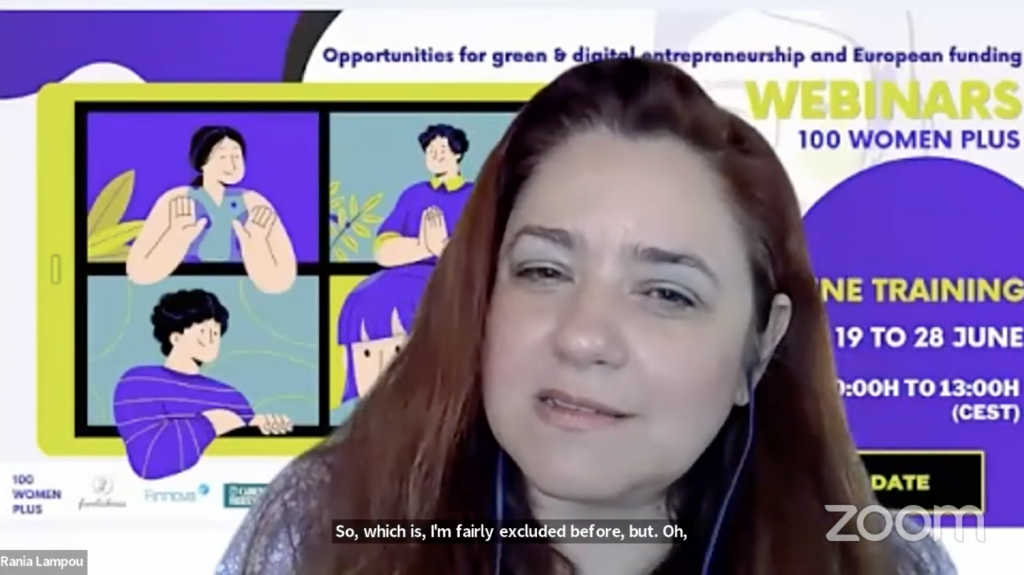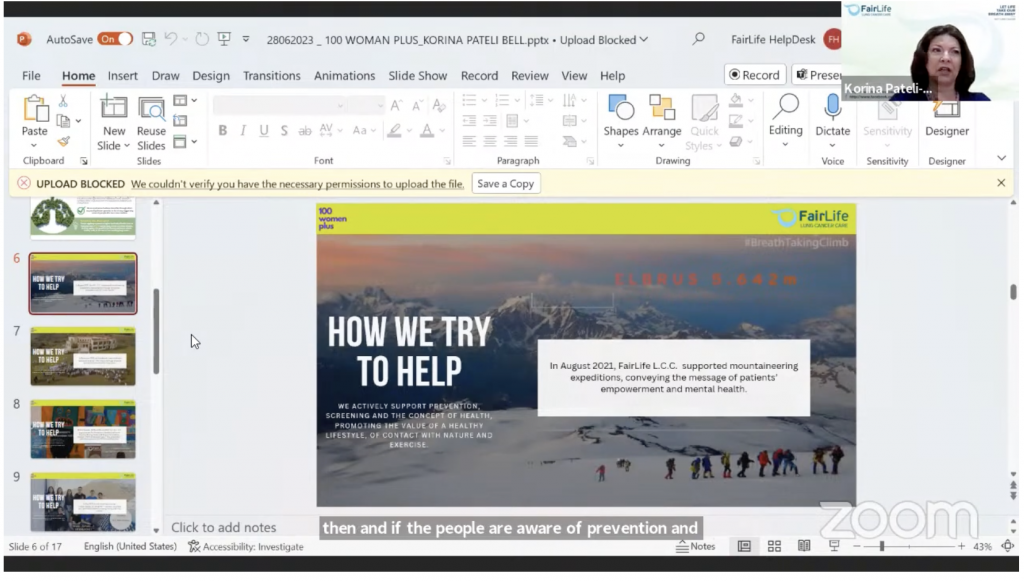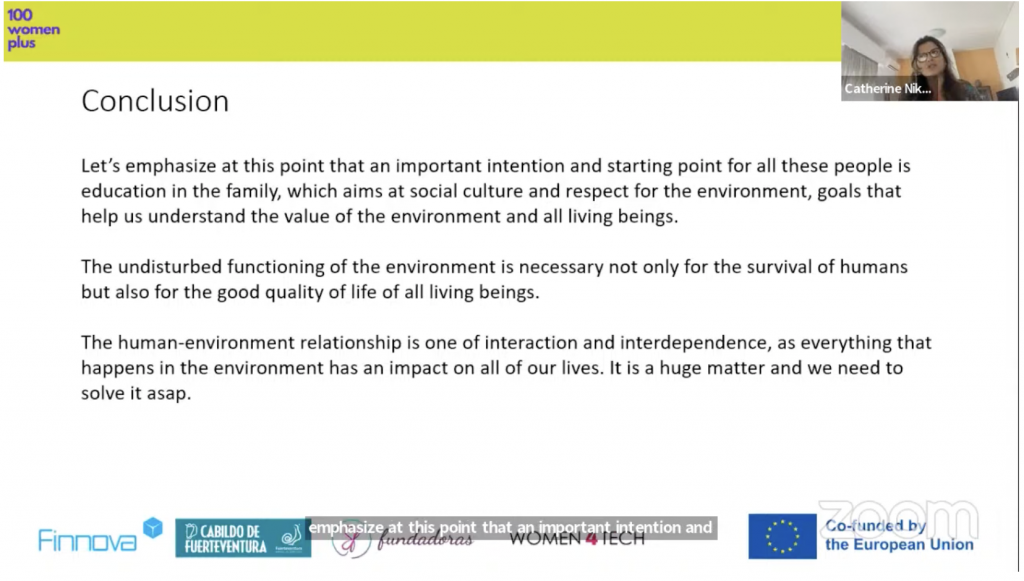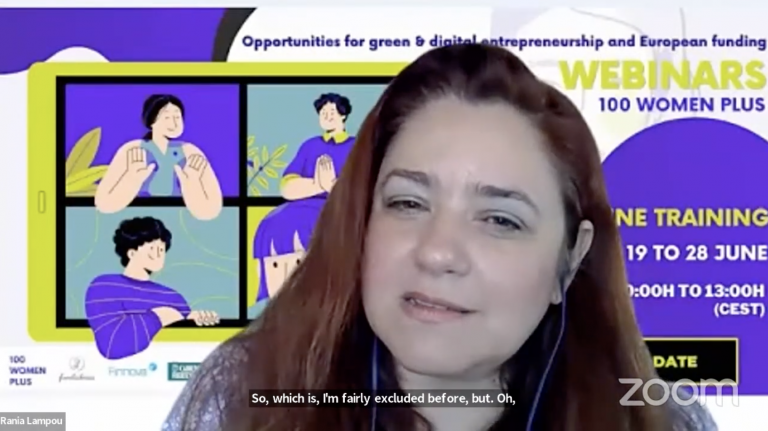
- The session was entitled “Examples and good practices”
- A total of 8 speakers took part in the conference
29/06/2023, Brussels. Yesterday, Wednesday 28 June from 10:00 to 13:00 (CEST), the fifth and final day of the webinar “Opportunities for green and digital entrepreneurship and European funding” took place. The day was full of positive examples of women’s empowerment in the workplace and the fight against climate change.
This last session was opened by Ana I. Alcaine, entrepreneurship project manager at EIT Food, who presented the Supernovas programme, which focuses on the inclusion of women in the entrepreneurial ecosystem. Alcaine explained the activities carried out by her organisation to favour the aforementioned inclusion and which facilitate women’s entry into different sectors such as investment (Women2Invest and Women Investor Network), entrepreneurship (RocketUp) or advanced technology (Women Leadership Programme). Finally, Alcaine presented different data on women founders and entrepreneurs in the European Union, highlighting sectors such as fashion and education as those with the greatest female presence and pointing out the under-representation of women in the world of entrepreneurship.
Shreyasta Sammal, a research and data engineer in media, image and video processing, presented her data intelligence app. In this case, the app is focused on mental health treatment and support in the fight against other diseases, a key area for Sammal: “researchers, engineers and researchers try to apply their products so that they are beneficial to humanity”. Sammal closed her presentation by also highlighting the limited presence of women in the research sector.
The next speaker was Korina Pateli-Bell, founder and president of the non-profit organisation FairLife Lung Cancer Care. Her speech focused on the link between pollution and lung cancer, which is why the organisation seeks to promote the creation of clean environments that improve public health. To this end, the organisation advocates raising public awareness of the issue, disseminating information on the subject and providing psychological assistance for people affected by the disease. As Pateli-Beli concluded, “our breathing is worth every fight”.

This was followed by Federica Scippa, project manager assistant at the European Regional Cooperation Framework (ERFC). She commented on the main activities of the ERFC and reviewed her experience as a participant in the Erasmus for Young Entrepreneurs programme, a transnational exchange programme that offers training by experienced entrepreneurs to young entrepreneurs and people wishing to set up a business.
Rania Lampou, global educator, STEM instructor and ICT teacher trainer, was the next one taking the floor. Lampou pointed out the importance of access to finance for women: “beyond financial support, they can increase their social capital and create support networks”. Later, she shared projects developed in Malawi, analysing the positive impact of education to favour the dissemination of responsible and active values in the fight for the protection of the environment among the youth.
Helena Kyropoulos, member of the European Regional Cooperation Framework, presented several proposals that her organisation is implementing. The main objective of the organisation is to advocate for international cooperation, through programmes such as Greenland (programme for unemployed people who want to be trained in ecology), CB Carbonfree (for companies who want to get involved in new holistic business mechanics), or BSBCircleCon (support for the circular economy in the Black Sea area).
The next lecturer was Johanna Suo, Culture, External Relations & Development ambassador of Diplomatic World Institute and founding partner of Artisans of Innovation. Her intervention focused on her collaboration with Diplomatic World Magazine, and her proposal for an educational strategy to promote the integration of women in politics. Finally, she underlined the importance of collaboration, networking and the exchange of innovation. The last speaker was Katerina Nikou, as representative of the Sciacca Awards for the promotion of science, culture and humanity. The annual winners are young scientists who offer alternatives to social problems (environmental protection, respect for animals, etc.). Nikou highlighted the relationship between humans and the environment, “an interactive and interdependent relationship, since everything that happens in nature affects us, and our actions affect nature”.

The session was closed by Juanma Revuelta, CEO of Finnova and Carla García, European Projects manager at Finnova. Revuelta conveyed a message of cooperation and aligned himself with values such as sustainability, the fight against climate change and female empowerment in the workplace. For her part, García was pleased with the outcome of the conference, of which she highlighted its purpose of promoting women’s entrepreneurship.
This was the summary of the fifth and last session of the webinars “Opportunities for green and digital entrepreneurship and European funding”. If you want to watch the session again, you can do it through this link: https://www.youtube.com/watch?v=6IEWzZBWlks&t=6684s&ab_channel=FINNOVA
About the 100 Women Plus project:
This project, co-funded by the EU Erasmus + Programme and led by Finnova, in collaboration with the Cabildo of Fuerteventura and the association Fundadoras, was born in an attempt to address the need for greater equality and to enhance international cooperation in the field of women’s empowerment. 100 Women Plus has been designed to improve the channels of collaboration and dialogue, propose a series of learning activities, exchange of experiences and transfer of results that contribute to establishing new mechanisms for female participation, strengthen the ecosystem of women entrepreneurs in the participating countries and create networks and generate alliances between institutions in Europe and Africa.
About the Finnova Foundation:
Finnova is the Spanish-Belgian non-profit foundation based in Brussels and Spain, working for the promotion and development of innovation and entrepreneurship in the EU. Finnova’s experience in leading communication and dissemination activities for European projects is combined with a proven track record in business creation and entrepreneurship support programmes, such as accelerators, incubators and events, as well as its commitment to training and employability of young people.

